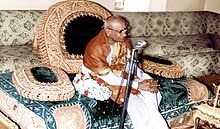This article needs additional citations for verification. (September 2007) |
Viswanadha Satyanarayana | |
|---|---|
 | |
| Born | 10 September 1895 Nandamuru, Krishna District, Madras Presidency, British Indian (now Andhra Pradesh, India) |
| Died | 18 October 1976 (aged 81) Guntur, Andhra Pradesh |
| Occupation | Poet |
| Period | 1919–1976 |
| Notable awards |
|
| Spouse | Varalakshmi |
| Children | 3 |
| Website | |
| www | |
Viswanatha Satyanarayana (10 September 1895 – 18 October 1976) was a 20th-century Telugu writer. His works included poetry, novels, dramatic play, short stories and speeches, covering a wide range of subjects such as analysis of history, philosophy, religion, sociology, political science, linguistics, psychology and consciousness studies, epistemology, aesthetics and spiritualism. He was a student of the illustrious Telugu writer Chellapilla Venkata Sastry, of the Tirupati Venkata Kavulu duo. Viswanatha's wrote in both a modern and classical style, in complex modes.[1] His popular works include Ramayana Kalpavrukshamu (Ramayana the wish-granting divine tree), Kinnersani Patalu (Mermaid songs) and the novel Veyipadagalu (The Thousand Hoods). Among many awards, he was awarded the Jnanpith Award in 1970, the first for a Telugu writer, and Padma Bhushan in 1971.[2][3]
The parallel "free-verse" movement in easy prose of Telugu literature criticised him as a bigot who hung onto the strict rules of poetry such as Yati, Prasa (rhyme) and Chandas (meter). However this only covers a part of the wide variety of literature he created. At the same time, there was no contemporary in Telugu literature who could match his depth of the subjects he covered and his mastery of literature. A book with his memories compiled has been released.[4][5]
- ^ "Classical Telugu Poetry". publishing.cdlib.org. Retrieved 23 May 2020.
- ^ "Jnanpith Laureates Official listings". Jnanpith Website. Archived from the original on 13 October 2007. Retrieved 7 November 2008.
- ^ "Padma Awards" (PDF). Ministry of Home Affairs, Government of India. 2015. Retrieved 21 July 2015.
- ^ V. Raghavendra (4 January 2014). "Book festival: stall showcasing works of 'Kavi Samrat' a highlight". The Hindu.
- ^ "Viswanatha Satyanarayana deserved a Nobel". The Hindu. Chennai, India. 22 July 2012. Retrieved 21 July 2012.